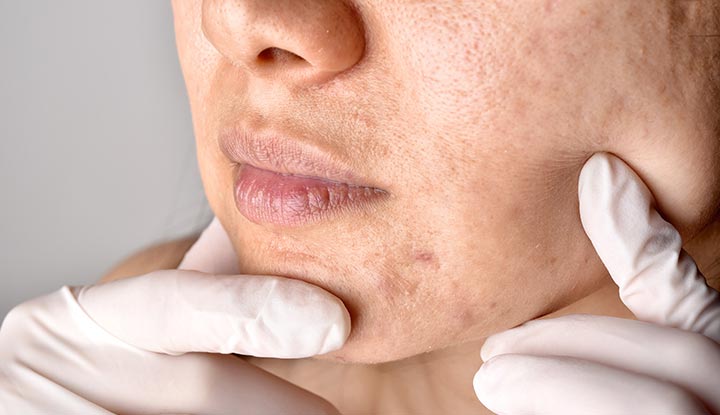Clogged pores are a common skin concern that may lead to acne. A buildup of dirt, oil or dead skin cells can cause clogged pores. The condition is most common in people with very oily skin. A gentle skin care routine can help resolve clogged pores.
Advertisement
Cleveland Clinic is a non-profit academic medical center. Advertising on our site helps support our mission. We do not endorse non-Cleveland Clinic products or services. Policy

Image content: This image is available to view online.
View image online (https://my.clevelandclinic.org/-/scassets/images/org/health/articles/22773-clogged-pores_1254400415)
Clogged pores develop when dead skin cells, oil or dirt get trapped in your pores. Pores are tiny openings in your skin that release oil and sweat from your glands. Clogged pores can lead to acne.
Advertisement
Cleveland Clinic is a non-profit academic medical center. Advertising on our site helps support our mission. We do not endorse non-Cleveland Clinic products or services. Policy
Clogged pores are common on people’s faces. However, they can occur anywhere on your body, including your scalp, neck, back, shoulders and chest.
Clogged pores and enlarged pores aren’t the same things, but they’re often related. Clogged pores can be the result of your glands producing too much oil. More oil on your skin increases the risk of clogged pores. But lots of other things can lead to enlarged pores, including age, skin products, hair follicles and sun damage. So enlarged pores don’t always lead to clogged pores.
Similar to acne, clogged pores tend to be more common in adolescents and young adults. During puberty, hormones stimulate the glands that produce oil. But anyone of any age or sex can get clogged pores.
Having a family history of acne or clogged pores can also increase your risk of having the same skin concerns. Sometimes you inherit genes from your parents that make you more likely to have very oil or dry skin.
Clogged pores are very common. Acne affects about 50 million people each year, and clogged pores are the leading cause of acne.
A buildup of dead skin cells, oil or dirt can clog pores. Possible causes include:
Advertisement
Some things that don’t directly cause clogged pores, but can make them worse, include:
Most people notice clogged pores only when they lead to one of the following skin concerns:
There isn’t a test for clogged pores. Your healthcare provider examines your skin and reviews your medical history. They may also ask you about your:
Most people can manage mild to moderate clogged pores by:
Clogged pores aren’t usually cause for alarm. They usually clear up with the right skin treatments. If you’re concerned about pimples or other blemishes caused by clogged pores, talk to your healthcare provider.
You can help prevent clogged pores by sticking to a skin care routine that’s right for your age, skin type and skin concerns. A dermatologist (medical doctor who specializes in skin conditions) can recommend the right products and treatments.
Advertisement
Other ways to prevent clogged pores include:
Contact your doctor if you have acne that is painful, inflamed, infected or filled with pus. You should also reach out to your provider if you notice any abnormal skin growths or lesions.
Clogged pores are a common skin condition caused by a buildup of dead skin cells, oil or dirt. Clogged pores can lead to acne, but they’re fairly easy to treat. Regular cleansing with non-comedogenic skin care products usually resolves clogged pores. Some people need special skin ointments that contain retinol or salicylic acid.
Advertisement

Sign up for our Health Essentials emails for expert guidance on nutrition, fitness, sleep, skin care and more.
Learn more about the Health Library and our editorial process.
Cleveland Clinic’s health articles are based on evidence-backed information and review by medical professionals to ensure accuracy, reliability and up-to-date clinical standards.
Cleveland Clinic’s health articles are based on evidence-backed information and review by medical professionals to ensure accuracy, reliability and up-to-date clinical standards.
Cleveland Clinic’s primary care providers offer lifelong medical care. From sinus infections and high blood pressure to preventive screening, we’re here for you.
